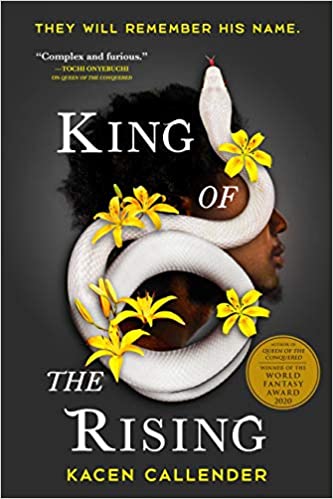Rating: 7/10
Synopsis
A revolution has swept through the islands of Hans Lollik and former slave Loren Jannik has been chosen to lead the survivors in a bid to free the islands forever. But the rebels are running out of food, weapons and options. And as the Fjern inch closer to reclaiming Hans Lollik with every battle, Loren is faced with a choice that could shift the course of the revolution in their favor-or doom it to failure.
Review
The King of the Rising is the follow-up to 2019’s Queen of the Conquered (my review of that book is here) and the finale in Kacen Callender’s Islands of Blood and Storm duology. This is a complex fantasy series built around themes of colonialism and power dynamics. I have mixed feelings about the direction this book ended up taking, so let’s dig in.
First off, we should talk about Loren, who is the main protagonist in this book. I think this is a great place to start because it is important to point out because Queen was told from Sigourney’s perspective, and it is extremely rare for an author to change main characters in a SFF series from book-to-book. I have not seen it often (though, this is the second time this year, and with a similar plot-induced reasoning). Sigourney is still present and still plays a big role in this book, but it is Loren’s perspective we get this time. I cannot say for sure the reason why Callender decided to go this route, but my guess is that the author thought readers would benefit from having another perspective. As we know, this series contains themes of slavery, oppression, and empowerment (and lack thereof), and demonstrates the effects these issues have on the people upon whom they are being impressed. What I gleaned from the perspective change is an opportunity to see the situation play out from another person’s point of view and show the reader how being powerless can impact everyone involved. I also think the author had other plans for Sigourney, and allowing Loren to lead the way opened up that opportunity.
Loren is young and new to leadership, he is easy to sympathize with at times, while other times his indecisiveness drove me crazy. Loren wants to be the decision-maker, but he also wants to make the right ones. He waivers a lot throughout the book, constantly asking himself who he can trust, whose interests are aligned with his, and whether or not he is the right person to lead the rebellion. Loren makes a lot of mistakes, which young commanders are prone to do. I think his journey in authority parallels the struggles of the people whom he serves.
I mentioned the magic system in my first review, what the people of the islands called “kraft”. This is one of the most controversial aspects of the book to me, because of the way people with powers are treated. Islanders with kraft are killed by the colonialists (the “Fjern”, as they are called). Their flimsy excuse is that the Fjern are given powers by their god, and any islanders born with it are aberrations: deviants who somehow came across the magic by mistake, or worse, ill-will. When in reality it is all about power. How do you hold power over an islander who can read minds or hurt those you consider beneath you when one of them can usetheir powers to heal? And someone whose power is to adopt the powers of others? It is unfathomable. I think this is a cool magic system, but I was also continuously frustrated by the way it was being used (or not used). It seemed as though oftentimes the kraft was wasted when it could have had a significant impact. On reflection, I do think that was purposeful on the part of Callender: to give us something as beautiful as people born with magical abilities, then demonstrate how it can be misused and abused if given over to the wrong hands.
There is much to be said about the plot, and as in the other aspects of the story there were facets of it I liked and others that I did not. The reader gets to know a few of the characters quite closely, so when every decision is literally life-or-death it creates a ton of suspense, and suspense that breeds tension is the lifeblood of many storylines, in my opinion, with King of the Conquered being no different. On the contrary, the plot also felt really scattered to me. I found it really difficult to follow, both on the narrative side and the physical side. It felt like the narrative pulled me in too many directions, and I had trouble getting lost in the story at times. On the physical side, Loren et al were literally all over the map, and I found myself having to reference the map in the book too often. Do not get me wrong: I love maps. But if I have to check it every chapter that takes me out of the story too often and kills my momentum.
There are many other items I could get into, but I want to try to avoid spoilers. I think it is important to note that, while I have pointed out some flaws, these seem to be very purposeful decisions by the author. It seems Callender did not set out to write a series that was widely appealing, but something that addressed some important topics. Positivity can be hard to find during a rebellion, and that can make it difficult to read. As I said before, this is a complicated and often uncomfortable story, but it is eerily reflective of what our society looks like right now. I cannot speak for the author’s intent, but that is what I got out of it.
King of the Rising seems to accomplish what it set out to do. While this book is not going to be for everyone, I do recommend it for those looking to broaden their horizons and tackle something outside of their comfort zone.





Leave a Reply